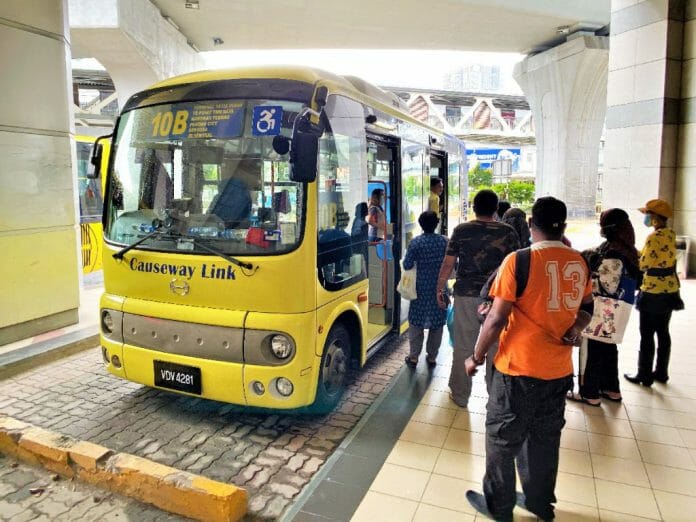
Published in Business Today, Astro Awani, theSundaily, New Straits Times, and Asia News Today, image by Business Today.
While Malaysians greeted the new year with an optimism in anticipating greater freedom of movement towards full reopening and normalisation that is underpinned by eventual endemicity, rising Covid-19 cases after the Chinese New Year (CNY) season has reignited a sense of economic uncertainty, instead. This is especially acute among small business owners and the low-income groups. The upcoming Johor state election has brought the so-called “perut” economy (bread-and-butter issues) to the fore with concerns revolving around the reopening that are particularly critical among Johoreans who depend heavily on Singapore in stimulating the state’s economy.
Even with no clear sight of the end of the pandemic, rising cost of living, disproportionate housing prices relative to income, stagnant wages, and highly leveraged finances remain some of the main “perut” economy components that worry Malaysians.
This has been clearly reflected in past EMIR Research quarterly polls that have identified these “perut” economy issues since the launching of the inaugural National Worry Index (NWI) in November 2019 – the period when Pakatan Harapan (PH) was still in power during the pre-pandemic period.
The term “perut” economy was coined by President and CEO of EMIR Research Datuk Wira Dr Rais Hussin to illustrate the issues that are the main source of the rakyat’s worry, which are as follows:
- High cost of living;
- Unaffordable housing;
- Access to quality healthcare;
- Unemployment (and under-employment), especially among the youths (together with the personal debts incurred in order to survive the hardships of life); and
- Access to quality education.
However, the change of federal administration from Barisan Nasional (BN) to PH after nearly two years did not result in sustained confidence among the rakyat in the aftermath of the euphoric victory which saw the overthrow of the “old order” that had been in power for 60 years.
Out of the 1,992 respondents across Malaysia, 30% disagreed with the statement that the PH government is viable with 46% being unsure of the performance. Only 24% said the coalition is viable.
About 86% were worried about the cost of basic needs and unaffordable homes. This was followed by lack of job opportunities (77%), youth employment (76%) and being in debt to sustain the cost of living (76%). The unemployment rate was at 3.2% in November 2019. On the other hand, the overall household debt-to-GDP ratio rose to 82.7% as of end-2019.
The announcement of the results from EMIR Research’s inaugural NWI were immediately followed by the resounding defeat of PH in Tanjung Piai on November 16, 2019 – that saw its share of votes across the ethnic communities collapsed.
At the same time, the Department of Statistics Malaysia (DOSM) stated that the Consumer Price Index (CPI) in November 2019 had increased by 0.9% as compared to November 2018. The increase in the CPI was due to the index of Miscellaneous Goods & Services (2.5%), Housing, Water, Electricity, Gas & Other Fuels (1.7%), Education (1.6%), Food & Non-Alcoholic Beverages (1.5%), Communication (1.5%) and Furnishings, Household Equipment & Routine Household Maintenance (1.5%).
The continuing uncertainty and pessimism of many Malaysians over the direction of the nation, economy and cost of living which spilled over into 2020 coincided with the collapse of the Pakatan Harapan (PH) government at the end of February of that year. Tan Sri Muhyiddin Yassin was then sworn in as the 8th Prime Minister of Malaysia on March 1, 2020, and led the Perikatan Nasional (PN) administration for only 18 months.
Notwithstanding, Tan Sri Muhyiddin performed reasonably well during the first few months. He managed to lower the Covid-19 cases by imposing strict lockdown measures (starting with the first Movement Control Order (MCO 1.0)) from March till May 2020. And with the balance struck between lives and livelihoods – in the reopening of the economy and the introduction of numerous stimulus packages – EMIR Research’s third quarter of 2020 (3Q20) poll showed that 65% out of 2,096 respondents were satisfied with the then Prime Minister’s performance.
However, the situation did not last long. The reopening of inter-state travels and relaxation of social gathering measures in November 2020 had eventually led to a spike of Covid-19 cases once again. With the imposition of the second MCO (MCO 2.0) from January till March 2021, EMIR Research’s 4Q 2020 poll revealed in February 2021 that 50% were unsure over the direction of the nation; 20% felt the current trajectory of the PN government was wrong; and only 30% were of the opinion that Malaysia was going in the right direction.
The survey also stated that 81% out of 1,976 respondents across Malaysia were worried about losing their jobs due to Covid-19. It was found that 79% of them were concerned about the threat of Covid-19 spreading its transmission in the community due to the entrenched presence of illegal or undocumented migrant workers. This particular finding was followed by quality of education (79%) and insufficient income (79%), mental health (75%), rising level of national debt (74%), quality of healthcare (73%) and patient waiting time (72%). As of February 2021, the unemployment rate was at 4.8%.
Although the National Covid-19 Immunisation Programme (NIP) that started on February 24, 2021, provided light at the end of the tunnel, the continuous four-digit daily infection figures from April till May 2021 left the government with no option other than to impose the third MCO (MCO 3.0) effective from May 12, 2021.
The third MCO that lasted for more than four months eventually led to the collapse of the PN administration. Dato’ Seri Ismail Sabri became the new Prime Minister on August 21, 2021. Although both the Muhyiddin and Ismail administrations provided several stimulus packages to ease the financial burden of the rakyat, many ordinary Malaysians were still struggling to cope with the rising cost of living.
The latest CPI in January 2022 shows an increase of 1.96%, compared to the year before in February 2021. As such, the hardcore poor and B40 households would feel even more economically and financially squeezed as rising inflation eats into their disposable incomes (or what is left of it). They require more spending to purchase essential items and even self-test kits due to rising Covid-19 cases during recent weeks.
With the new minimum wage set to be introduced in accordance with the National Wages Consultative Council Act (2011) albeit yet to be finalised and approved by the Cabinet when current conditions of persistent inflationary pressure emanating from supply-side disruptions have yet to subside on a sustainable and steady basis, small and medium-sized enterprises (SMEs) would feel increased cost pressures.
Whilst the minimum wage is necessary and the right policy move to help ensure that the lower-income groups have earnings that increasingly approximates the “living wage”, the timing could not have been worse. Another economic uncertainty in the cost of doing business is the prospect of Bank Negara raising the Overnight Policy Rate (OPR) in the second half of the year. Counterpart central banks across the major economies are now under intense pressure to do something to combat rising inflation that is expected to persist over a longer term or period than hitherto expected.
As it is, based on experience and empirical findings, the price of a good is dependent on the cost whereas the quantity is determined by the market forces of supply and demand as propounded by the eminent Keynesian economist Nicholas Kaldor (Economics without Equilibrium, 1985).
This means that inflation can be said to be pre-eminently a “pricing” problem understood as “stylised fact”, i.e., simplified presentation of an empirical finding ((see e.g., Inflation as Restructuring. A Theoretical and Empirical Account of the US Experience, 1992 – PhD thesis – by Jonathan Nitzan), though not necessarily always the case or universally so. To be more precise, inflation is a structural issue which necessitates an institutional response (rather than a “market-clearing” mechanism that is supported by monetary policy in the form of the interest rate as the primary actor or uncoordinated with fiscal policy).
Practically speaking, we know that inflation always ends up eroding purchasing power and increasing the cost of living. It is one of the factors that aggravates the worry and anxiety of ordinary Malaysians as they grapple with indebtedness, stagnant and poor salaries/wages, economic uncertainty, and not least the scarring and “multiplier” effects of Covid-19.
Now with the looming Johor state election, it could be argued that like many Sabahans, Melakans and Sarawakians who have voted in the recent state elections, respectively, Johoreans would appear to be also more concerned about the “perut” economy such as cost of living expenses, employment and income over which coalition is considered the best or most trustworthy to form the next state government.
Amanda Yeo is Research Analyst at EMIR Research, an independent think tank focused on strategic policy recommendations based on rigorous research.

